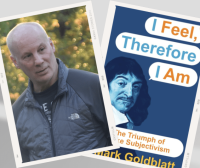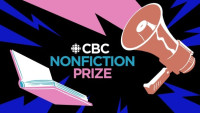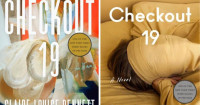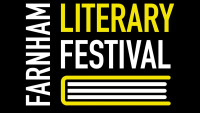
Minding the ‘Brand,’ for Better or for Worse
observer.com – Tuesday January 9, 2024

Branding has forever changed the publishing industry and, in the process, what it takes for ambitious authors to break in.
Over the last year, three books of mine have been published. The first, from a large indie press, was a philosophical takedown of woke subjectivism. The second, from a U.K. press specializing in rock star memoirs, was a middle-grade novel about a traumatized kid who begins to hallucinate the ghost of John Lennon. The third, from a conservative-libertarian startup press, was a comic novel set at the dawn of the social media age, about a 30-something mom whose ne’er-do-well husband convinces her to post risqué photos on the internet.
You’d think three books in one year would be a cause for celebration. Yet I’m driving my loyal-to-a-fault literary agent crazy… because I don’t have a brand.
Brands are shorthand devices to convey clusters of information. Most large corporations have a brand. Pepsi has one. So does Burger King. So do Nike, Cadillac and Citibank. Each brand has an instantly recognizable logo, intended to differentiate the business from its competitors and remind you that you’re dealing with an established, credible entity. But a brand also limits the brand-holder’s relevance. If Pepsi, for example, announced it developed a kiwi-infused cola, I’d be intrigued. Pepsi does a fine job with colas, so its processes should work with kiwi flavor. On the other hand, if I’m shopping for auto parts and see Pepsi snow tires, I’m going to pass since that’s not what Pepsi is known for. The company may produce a hell of a tire, but why go that route when you can go with Goodyear—a brand specifically known for tires? It would be like buying Goodyear ginger ale. Or Cadillac cotton swabs.
So it makes sense for businesses to develop a brand. Yet there’s something counterintuitive and vaguely philistine about the notion that writers should develop one. What is a writer’s brand? Essentially, it’s a cross between a credential and an identity. It’s the way the writer is viewed by potential readers and the public face by which he’s already known or will be known; it provides a roadmap for publishers to market his book. Here is the reality of publishing in 2023: Absent a discernible brand, a writer’s chances of finding a commercial publisher are severely diminished. Brands are a particular concern of the marketing departments at publishing houses, as you’d expect. But they’re also on the mind of editors at every stage of the publishing process, figuring prominently not only in getting the book into readers’ hands but also in the decision to acquire a manuscript in the first place.

ChatGPT for Creative Writing: Unleashing Your Imagination in 2024
geeky-gadgets.com – Friday January 5, 2024

In 2024, the landscape of creative writing has been revolutionized by the advent and integration of advanced AI technologies, with ChatGPT at the forefront. This tool, built upon the sophisticated GPT-4 architecture, has emerged as a powerful ally for writers, poets, playwrights, and other creative professionals. Its ability to generate human-like text, brainstorm ideas, and assist in the writing process has opened new avenues for creativity and innovation in the literary world.
The Evolution of ChatGPT in Creative Writing
To appreciate ChatGPT’s role in creative writing, it’s essential to understand its evolution. Initially, AI writing tools were primarily used for generating short, formulaic text. However, as these models became more advanced, they started showing potential in aiding more complex and creative writing tasks. With the introduction of GPT-4, ChatGPT became capable of understanding and generating nuanced, contextually rich, and stylistically varied text, making it an invaluable tool for creative writers.
Understanding ChatGPT’s Capabilities
ChatGPT’s strengths lie in its ability to process and generate language in a way that closely mimics human thought and expression. Its training on a diverse range of texts enables it to offer stylistic suggestions, and narrative ideas, and even help with character development. For instance, a writer struggling with dialogue can turn to ChatGPT for examples of how a conversation between characters might flow. Moreover, its capacity to understand and emulate various writing styles allows it to provide targeted assistance, whether one is writing a hard-boiled detective story or a romantic sonnet.

2024 CBC Nonfiction Prize is now open
cbc.ca – Tuesday January 2, 2024

The 2024 CBC Nonfiction Prize is currently accepting submissions until Friday, March 1, 2024 at 4:59 p.m. ET.
Keep reading to learn about the prize, what you can submit and what you can win!
Who can enter?
The prize is open to all Canadian citizens and permanent residents of Canada.
There is no age requirement, but if you are a minor, there is a box to check on the entry form. You will need a parent or guardian's signed authorization only if your entry makes the longlist.
What can you submit?
You can submit original, unpublished nonfiction that is up to 2,000 words. There is no minimum word requirement. Nonfiction includes memoir, biography, humour writing, essay (including personal essay), travel writing and feature articles.
Quote of the Day – Heinlein’s Rules of Writing
ricochet.com – Monday January 1, 2024
With the new year at hand, the bane of every new year is upon us: New Year’s resolutions. You tell yourself “I’m gonna really, really, really, do that thing I’ve failed at for the last nine years running. Who knows? Tenth time might be the charm.”
There is nothing wrong with setting goals. I do it all the time. It is a good thing. While you may not achieve every goal you set, you achieve exactly none of the goals you don’t set. My beef is tying that goal to an arbitrary beginning of the year. It seems unserious. If you are going to set goals, don’t wait until New Year’s Eve. Just do it when it’s appropriate. Everyone else seems to disagree with me (something I am used to), so scads of you will be making New Year’s resolutions anyway.
One of the more popular resolutions among the more intellectually inclined (which includes many Ricochetti) is “This year I’m gonna become a writer.”

Opinion: As a writer I don’t despair about AI — it can’t replicate our imaginations
latimes.com – Monday January 1, 2024

When I first encountered generative AI at a law seminar two years ago, I had the passing thought, as a novelist and critic, that it could actually be good for fiction written by humans — at least the kind of fiction I like.
Just think: Machines would potentially standardize prose in a contemporary fiction landscape that already tends to value minimalist writing, and the ease with which robots might reproduce simple sentences and formulaic plots would mean that the stylists, the eccentrics, the strangely passionate human authors would finally stand out. This optimism was quickly defeated by the realization that one of my day jobs, as a ghostwriter, would almost certainly become automated.
At my mother’s house that evening here in Northern California, I ranted about this development in a society that already devalues art and the printed word. I preached about how ridiculous it was that artificial intelligence companies and startups were creating meaningless applications that reinforce layers of racial bias and leave a heavy carbon footprint, rather than investing that money and time into, say, solutions to mass incarceration and climate change.
My mother has had a long successful career in tech and remains involved in the field of AI. She’s one of the most moral and wise humans that I know. Unfazed by my argument, she said, thoughtfully, “Yes, ChatGPT will probably change things.”

Lasting reputations: why have some authors dominated the publishing industry?
theboar.org – Sunday December 31, 2023

Life Before Man, The Cement Garden, Grimus. Whilst this may just seem like a list of books published some five decades ago, all these books have one thing in common. Their authors, who found fame in the 1970s, are still being revered for their literary efforts in 2023. Atwood, McEwan, Rushdie – all stalwarts of the “Old Gang” who are still finding their books in best-seller lists today. When so many new authors are fighting to be seen on bookshop shelves and to be promoted on social media, it may seem absurd that we are still returning to books by older authors, but nevertheless, their works have a longevity that have allowed them to continue selling thousands of copies in the 21st century, whether this seems detrimental to the literary industry or not.
The 1970s was a time of change across the literary scene. In the backdrop of a more turbulent political and social landscape, authors were honing in on a reflective style with texts encompassing an awareness of the changing world they formed a part of. The youthful voice was being captured with the emergence of upcoming authors like Toni Morrison and Martin Amis. Literature was being used as a vehicle for political and social change. Yet, ironically, the call for modernising which was ever present in the 1970s is something that is being halted today by the authors of that era outlasting many of their contemporaries.

Writers: Now Is The Time To Set Your Goals For The New Year
nofilmschool.com – Saturday December 30, 2023

As the New Year unfolds, it's a time of reflection and renewal, not just in our personal lives but also in our creative endeavors.
For writers, this period holds a unique significance. The turn of the year is an ideal moment to set intentions, to chart a course for the months ahead in their writing journey.
Every December, I sit down and make a list of what I want out of the New Year, and I think it has helped me move my career forward in wonderful ways.
So, I'm here to share that strategy with you.
Whether you're a seasoned author or just starting to dabble in the art of words, setting intentions for the New Year can be a transformative practice.
In this post, we'll delve into why it's particularly crucial for writers to set their intentions and offer practical strategies to ensure these goals are not just set but also achieved.
Let's get started.

The Fine Art of the Paperback Makeover
nytimes.com – Thursday December 28, 2023

Redesign? Relaunch? Regret? Take a look at the ways publishers aimed to seduce new audiences by changing up the covers of notable books.
“You never get a second chance to make a first impression,” the humorist Will Rogers once said — which tells you he wasn’t a book publishing executive. In that world, the paperback edition is the second chance, an opportunity to market a book at a lower price and, in many cases, with new cover imagery aimed at new audiences.
Goals can include getting big-box stores to display the book, Instagram browsers to pause before swiping, or readers to rethink what’s between those covers. “The shift in perception can be quite dramatic or quite subtle, but the energies are redirected,” says Mitzi Angel, the president and publisher of Farrar, Straus & Giroux.
Here are the stories behind eight intriguing 2023 paperbacks (and a sneak peek at the new look for Eleanor Catton’s novel “Birnam Wood,” coming in 2024), with behind-the-scenes insight into what you see — and what you may not, unless you pay close attention.

Skyhorse Is Buying Regnery Publishing
publishersweekly.com – Saturday December 23, 2023

Salem Media Group’s sale of its Regnery Publishing division, which was said to be dead in late November, has been revived. On December 21, Skyhorse Publishing announced that it had signed an agreement to purchase Regnery, one of America’s best-known publishers of conservative authors. Terms were not disclosed.
“We are so pleased to acquire this legendary publishing company, founded over 75 years ago, and are committed to building on the strong foundation that the Regnery staff has developed,” said Skyhorse president and publisher Tony Lyons in a statement. Regnery, which has a list of about 1,550 titles, will become an imprint of Skyhorse Publishing and will maintain its own identity, Skyhorse said. According to Skyhorse, Regnery’s sales in 2023 are projected to be approximately $10 million.

Farnham Literary Festival launches ‘First Five Thousand’ writing competition
petersfieldpost.co.uk – Thursday December 21, 2023

Farnham Literary Festival has launched a new ‘First Five Thousand’ writing competition.
Writers aged 18 and over are challenged to submit the first 5,000 words of their novel with a 300-word synopsis. The work does not have to be finished.
One lucky winner will receive £100 and a literary critique of their work, the runner up will get £75 and three shortlisted entries will receive £50.
The judging panel consists of Louise Morrish, BA Paris, Gill Thompson and Melanie Whipman.
Get the free newsletter | Submit a news item or article | Get Writers' News for your website





